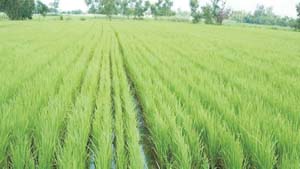/topics/rainfed-agriculture
Rainfed Agriculture
Ajunhi kordech aad (The wells are still dry) - An article in marathi - Anubhav magazine
Posted on 03 Dec, 2011 11:53 AMA large part of the state of Maharashtra continues to face acute scarcity of water due to scanty rainfall, which has had a serious impact on the livelihoods of people who live in these areas. This article "Ajuni Kordech Aad" meaning "The wells are still dry" published in the magazine Anubhav highlights the extreme hardships, lack of employment opportunities, forced migration due to negative impact on agriculture and livestock, and poverty and deprivation that people living in these areas have to face due to this water scarcity.
Thembe thembe samruddhi (Prosperity with every drop) - An article from the magazine Anubhav
Posted on 02 Dec, 2011 03:23 PMThis article in Marathi from the magazine Anubhav titled 'Thembe thembe samruddhi' meaning 'Prosperity with every drop' highlights the situation of acute scarcity of water in the state of Maharashtra and argues that this has been a barrier to the progress of the state leading to dire poverty and deprivation.
Gravity based spring water supply systems in Andhra Pradesh: Lessons and steps towards the future
Posted on 22 Nov, 2011 07:35 AMGuest post by – Rahul Bakare, Arghyam
This article details an example where local knowledge has been used to develop access to safe water in the tribal areas of the Eastern Ghats in Andhra Pradesh
Living rivers, dying rivers: Rivers in North East India
Posted on 15 Nov, 2011 03:29 PMRivers in North-East India

Assam’s strategy and action plan on climate change - Recommendations - First draft - ASTEC (2011)
Posted on 07 Nov, 2011 11:20 AMThis report by the Assam Science Technology & Environment Council (ASTEC) contains the compiled recommendation of three consultative workshops organized in Assam University, Gauhati University and
Zero tillage in the rice-wheat systems of the Indo-Gangetic plains - A review of impacts and sustainability implications by IFPRI
Posted on 31 Oct, 2011 06:49 PM This paper by the International Food Policy Research Institute (IFPRI) reviews the success of zero-tillage wheat in the rice-wheat systems of the Indo-Gange
This paper by the International Food Policy Research Institute (IFPRI) reviews the success of zero-tillage wheat in the rice-wheat systems of the Indo-Gange
New hope for Indian food security? The System of Rice Intensification – A paper by International Institute for Environment and Development
Posted on 29 Oct, 2011 11:43 AMThis paper from the gatekeeper series of the International Institute for Environment and Development (IIED) describes the potential of an innovative rice cultivation practice-the system of rice intensification (SRI)—for allowing Indian rice farmers to not only enhance rice production and their net incomes, but also to solve the water crisis.
Climate change impact on hill agriculture and farmers adaptive strategies – A case study of Kullu valley in Himachal Pradesh
Posted on 26 Oct, 2011 06:35 PMIt takes apple as an indicator crop to investigate the positive and negative effects of climate change on farm economy. The research is a field study to determine the agricultural and socioeconomic impact of climate change on the farmers apple economy of the Kullu valley in Himachal Pradesh, India.
"The water in springs of my hills is cool, do not migrate from this land, o my beloved" - Solving water shortages through ancient knowledge
Posted on 24 Sep, 2011 12:33 AMAuthor: Anupam Mishra
"The water in springs of my hills is cool, Do not migrate from this land o my beloved.”
RRA invites call for proposals on action research on support systems for rainfed agriculture – Apply by October 15, 2011
Posted on 05 Sep, 2011 04:04 PM 
Revitalising Rainfed Agriculture (RRA) is established at Hivos in partnership with Ford Foundation. The network documents and synthesises lessons from field experiences in soil, seeds, water, millet-based crop systems, fisheries, livestock, credit, markets and institutions. It generates large-scale field experiences through comprehensive pilots in convergence with government programmes.




